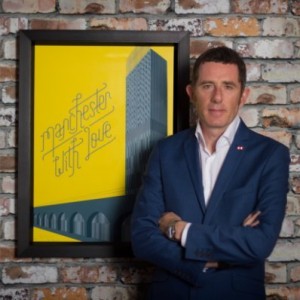This week I interviewed Phil Jones, Managing Director of Brother UK, the UK arm of the multinational information, communication and technology manufacturer. Phil was recently awarded an MBE for Services to Business and is a highly respected business leader, blogger and motivational speaker.
As with all the CEOs/MDs I’ve interviewed, Phil speaks very frankly and openly about the value he gets from social media and how important he sees it becoming as a leadership tool.
What value do you get personally from using social media (particularly Twitter)?
Signing up back in 2009, my intention was to simply understand what it was all about. Since then it’s become an essential tool in many ways. Your previous interviewers have already outlined all the major benefits, but I’d add:
Accessibility – the more accessible you are, the more opportunity reaches your door. This interview is a good example. In a world where proximity matters, if people know you on social media then you are more likely to be in their ‘top three box’ on any point of consideration. As my friend Andy Lopata says, “It’s not just what you know and who you know, it’s who knows you,” which is an updated version of the sound bite.
As we’re a large business, people may be intimidated by its size and perhaps overwhelmed when considering joining the organisation. Twitter means people can talk to me directly, offer opportunity directly and quickly be ‘oriented in’ or filtered out. It means we get to see a lot of opportunity before many other organisations of our size and scale – our proximity and accessibility being the key drivers. It’s also great when someone tweets me a picture of their new Brother product, associating the person and the brand.
“We get to see a lot of opportunity before many other organisations of our size and scale – our proximity and accessibility being the key drivers”
Reputation – The expectations of people from all walks of life have changed, especially when it comes to what they expect from business: transparency, trust, recognition, proximity, immediacy – you name it. Remaking the old saying ‘The customer is king’ into a modernised version, ‘the customer is King Kong’ with respect to their ability to galvanise a movement against your organisation if your product/service is poor. It just highlights the need for you to socially monitor and react as part of your wider reputation management strategy.
Cultural and Talent Simmer – We’re a social organisation, not just digitally but also as people. The whole culture has a ‘family feel’ and we’ve used our internal social media network Yammer to socially share all types of news in the business. I’ve learned through on-boarding coffee mornings that most new joiners have ‘socially audited’ me prior to joining. By doing this they were looking to acquire a good sense of what type of person I am, what leadership style I might have, what my principles and beliefs are and whether we, as a business, are socially relevant in a digital world. So if you want bright people to join you, it makes total sense to ensure you have a digital breadcrumb trail and can be easily found.
“If you want bright people to join you, it makes total sense to ensure you have a digital breadcrumb trail and can be easily found”
As well as being a busy Managing Director, you’re also a keynote speaker, blogger and non-executive director. How do you find time to fit it all in and what role does social media play in promoting your ideas and your ‘personal brand’?
I’m asked this a lot and I guess it comes down to having an amazing team around me, executing a well-defined strategy, as well as these things:
1. Learning how to fully delegate to my team
2. Having a superb Executive Assistant (Manchester PA of the Year I might add)
3. Being highly prioritised about what I say yes and no to
4. Using tools as much as possible (I use rules on e-mail, Hootsuite to filter tweets, a whitelist for callers to the office, etc.).
I wrote a blog in December 2014 called 15 Productivity Hacks which explains this more.
Social is key in all of this as it allows me, as a leader, to communicate at all levels, both internally and externally. Most buyers don’t want to deal with faceless corporations but instead want to understand the people and ethics behind the business. Having a social presence achieves so many things in terms of ‘humanising’ a company and providing a clearer picture of who is in charge. I do all my social media myself: no agency, no outsourcing, no paid writers. If it is about brand authenticity, then I can stand behind anything I’ve said.
“I do all my social media myself: no agency, no outsourcing, no paid writers”
If you could give advice to other CEOs or MDs who are reluctant to embrace Twitter what would it be?
Listening to a talk recently about board members often being ‘blockers’ to social media, it occurred to me that one of the challenges is ‘how do you get the C-Suite thinking more ‘D’ (Digital)?’
Often it’s fear (lack of knowledge, harm to corporate reputation, lack of priority). Developing your individual social footprint can be a leap of faith – a leap into the unknown where you have to accept some risk. However, people are talking about your brand whether you like it or not, so choose to be in the conversation rather than ignore it. Get some help, start one platform at a time where you think it can have the most relevance. From my side, I only really use Twitter as my ‘real time’ social channel externally.
“People are talking about your brand whether you like it or not, so choose to be in the conversation rather than ignore it”
What are the drawbacks for CEOs not being present on social?
I talk often about the idea of having to be ‘ACE’ to meet the demands of the modern day consumer. ACE is an acronym for ‘Availability, Convenience and Expectation’. The B2B/B2C split still exists to help determine whether a buyer resides in a business or is buying for home, however, we take more of a ‘B2ME’ view on this stuff, as people are much more sophisticated in the way they buy and research, using devices to blend their work/private life.
As consumers we now have certain ‘expectations’, so if we want to communicate with a brand, then we reach out on social media. People have become highly familiar with the idea that senior people are on social (Barack Obama and Richard Branson for example) so in terms of relevancy, you simply have to be there.
If you’re not on social you run the high risk that you may not make the ‘consideration phase’ of the sales funnel or see the real-time feedback that people leave about your products or services. OK, it’s not always comfortable, as sometimes expectations are unrealistic or we may have slipped up, but it’s far better to be tackling it than avoiding it.
“People have become highly familiar with the idea that senior people are on social, so in terms of relevancy, you simply have to be there”
From my perspective, if a brand doesn’t have a social presence I’m already questioning whether it is a customer-focused business; however, if I see the CEO active on social, then I’m already positively disposed towards them and more likely to gravitate towards them.
There’s so much chatter about ‘talent’ and ‘recruiting and retaining’ that not being on social media is a major drawback in my opinion. People of all generations want more purpose in their work and are becoming choosier about where they work, who they want to work for and how it aligns with their personal values. Without a social footprint you may easily be tossed into the ‘irrelevant’ pile of potential employers.
You have your own blog. Tell me a bit more about that. Why did you set it up and what is its main purpose?
Initially, I just had all this knowledge in my head and was looking for a place to record some of it. I went through a phase where I just wanted to write and write and the blog became the outlet for it. I’d also noticed around 2010 that more and more people were talking about the idea of creating your own personal brand, which made sense given all the activity around platforms.
Thinking that through, I began to realise that this could have a profound effect on the reputation of your business, how you can show people your personality as a leader, which has a knock-on effect on recruitment and retention, as well as sharing my thinking and the lessons I’ve learned so others could benefit from them.
I wouldn’t say I’m the best writer in the world, however people are really forgiving as they realise the intent is good and it comes from me personally, it’s not written for me by an agency or third party as often happens in such cases. It’s very rewarding when someone comes up to me at a conference or sees me and shares how they’ve used the content to change their own outcomes.
You also publish a lot on LinkedIn Pulse. Do you find it useful as a blogging platform? How does it compare to your personal blog?
I actually switched a lot of my publishing onto LinkedIn so as to benefit from the algorithms which can really extend/amplify your reach on a post. Not only does it go to your own network, but any likes get extended out beyond your own first-level connections. Engagement increases and those people in your own network get to see your stuff more regularly as it’s a familiar platform which they visit frequently.
LinkedIn as an application can still be a little clunky in terms of user experience, but it automates a lot of the things which you may have to do manually if publishing on your own blog.
I enjoyed your recent article on communicating strategy. Why do you think so many CEOs feel the need to couch corporate messages in ‘management speak’? Is it a regulatory requirement, a legal requirement – or just a lack of confidence in ‘saying it how it is’?
I guess it’s all to do with the organisational and sector vernacular (did I just say that? LOL).
Over many years running a big company, and also involved in many international meetings and group initiatives, you get to hear a lot of it. As a self-confessed ‘management talk speaker’ it’s something you have to become really aware of when, for example, briefing the whole company on our outlook or plans (which we do quarterly). Keeping things simple works. Much depends on your audience; when briefing analysts for example, dialing up industry jargon may be perfectly acceptable (providing you can back it up of course).
I’d recommend everyone to follow @managementspeak on Twitter, a parody account for such talk which is a great ‘sense-checker’ for whether you’re falling into the trap.
As the MD of the UK arm of multinational information, communication and technology manufacturer, how do you see digital disruption and the IoT impacting on your industry?
It’s great fun to be in charge of the ship as we navigate the sea of digital change. As a business which makes – in a wide portfolio – computer printers, then clearly we have to be on our game!
The business has been going since 1908, so we know a thing or two about waves of changes and how to successfully navigate through them. Japanese businesses tend to think very long term, in 25-100 year cycles at times, so long term orientation is very familiar.
Nevertheless, the cloud has sped up connectivity, collaboration and connectedness, accelerating the cycle time of innovation, so it’s key to always keep looking over your shoulder, observing, listening and configuring your business so it’s in a state of ‘alacrity’ (happy state of readiness) to react if required.
Sensor technology and the IoT means just about everything that exists will be able to be monitored, which will mean expectations for everything we make will have to be ‘connectable’ and ‘manageable’ remotely. We have a large force of software developers all over the world, so we’re well-placed to react to the trend. We can operate in the areas we have ‘permission to play’ so it’s all about finding the customer pain points where such sensor technology can lead them to work smarter.
Digital disruption is all around us, the key thing is to continue to incrementally innovate everything you do and have an environment where you move quickly. We’ve gone through a number of phases of big eating the small, small eating the big – now it’s the fast eating the slow. The entire industry needs to ensure they are keeping up, revising their business models and capability and staying relevant.
“We’ve gone through a number of phases of big eating the small, small eating the big – now it’s the fast eating the slow”
Lots of tech start-ups were able to use the lag time of bigger business to disrupt some key sectors and markets (Fintech is a good example), however big businesses are catching up quickly and becoming quicker and better organised, which means they’re becoming nimbler and more capable, as well as collaborating much more than ever.
I mentioned earlier the lack of digital skills in the boardrooms of many established businesses – that has to change. I describe it as the transition of the ‘C’ suite to the ‘D’ suite (digitally enabled executives). For those businesses that fail to address this, they may well be on the wrong side of creating a ‘Blockbuster’, that is, they are likely to go out of business rather than create a blockbuster product, technology or service.
Finally, congratulations on your MBE for Services to Business! How has the award changed how you view your role as an MD and business ambassador?
Well, firstly nothing’s changed as far as I’m personally concerned. It was a big surprise to get the letter from the Cabinet office; however I don’t pursue this type of recognition. For me life is always about the cause before the applause and I’m always a little uncomfortable when the spotlight shines my way.
It was such a busy week following the official announcement, dealing with around 600 messages of congratulations, and it was hugely humbling to hear feedback from so many people about their view of you and – more importantly – how you have helped them on their pathway.
Our purpose here at Brother UK is ‘to grow ourselves through growing others’, so sharing our knowledge on the pathway to growing others comes very naturally to us as a business, and to me as a person.
What’s been brilliant to observe is how those people that I work with view it – how happy they are for me – and to read all the cards that arrived on my desk with personal messages. It was hugely emotional and I was exhausted by the end of the week; it took a good three hour bike ride to get it all cleared down!
Anyhow, in terms of what’s changed, well the words haven’t changed, not has the person or organisation. For me it’s about using it as a platform for doing more good work and sharing everything I know to improve outcomes for others.
I guess externally, if someone doesn’t know you, they may see those three letters and make new assumptions about you, positive or negative. If those people that don’t know us listen with more intent as a result of my having an MBE, then that’s brilliant.
_____________________________________________
Many thanks to Phil for sharing his insights and philosophy. He’s clearly a leader who understands the ‘social age’.


